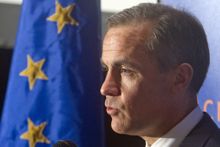
Bank of Canada governor Mark Carney, a former investment banker, has been chosen by G20 leaders to serve as the new global watchdog on the world’s financial fat cats.
The sharp-tongued 46-year-old is being handed the task, in turbulent times, of keeping the world’s biggest banks from engaging in the kind of risky behaviour that ran the world’s economy off the rails in 2008.
Carney will take over the chairmanship of the Financial Stability Board from Italy’s Mario Draghi, who has moved on to the European Central Bank. He does so at a time when G20 leaders are giving the international board more staff and resources and greater “name and shame” powers in an effort to rein in global financial giants.
Prime Minister Stephen Harper, speaking in Cannes after the conclusion of the summit, was among the first to congratulate the central banker, whom he appointed back in 2007.
“It is the first time a Canadian has headed an international financial institution of such wide scope,” he said. “His appointment is both a tribute to his personal qualities and a reflection on Canada’s superior performance in monetary, fiscal and financial sector policy areas.”
A spokesman for the central bank said the governor would not be available for interviews about the appointment Friday, but released a statement quoting him as being “honoured to assume this new role.”
Coincidentally, the FSB released a list 29 banks deemed too-big-to-fail that will come under its purview. None are Canadian.
The new position does not affect Carney’s tenure at the Bank of Canada — a seven-year-term that expires in 2015.
Bank of Montreal chief executive Bill Downe called Carney “the right person at the right time.”
“Governor Carney comes to the post at a time when the international financial community is seeking clarity,” he said in a statement.
“There is no question that the governor is exceedingly capable and he has enormous personal credibility — both in Canada and around the globe.”
Since taking control of the Canadian central bank, Carney has been a strong and consistent advocate for the need of more stringent regulations for banks, receiving international notice and mostly praise.
His 13 years as an investment banker with Goldman Sachs, working in London, New York, Tokyo and Toronto, also gives Carney an inside view of the industry he’s now charged with regulating. Only the world’s biggest financial institutions — none of which are Canadian — fall under the FSB’s mantle.
His experience in both worlds will come in handy when Carney needs to rein in the independence of major financial institutions, especially those on Wall Street used to getting their way in Washington, said TD Bank chief economist Craig Alexander.
“Leaders of financial institutions can’t go to governor Carney and say, ‘You don’t understand the environment in which we operate.’ He does understand, so that argument won’t work,” Alexander explained.
Carney got a preview of what to expect in September when, according to reports, he received a tongue lashing at a closed-door meeting from JP Morgan Chase head Jamie Dimon over the new proposed regulations. According to reports, Carney held his ground.
Unruffled, the Canadian banker addressed financial players at the Institute of International Finance a couple of days later and offered no sympathy for Wall Street’s complaints.
“If some institutions feel pressure today, it is because they have done too little for too long, rather than because they are being asked to do too much, too soon,” he told the audience.
It’s the kind of blunt, direct talk that has made Carney a darling of the international financial press and a nice fit for G20 leaders hoping to flex some muscle.
Last year, Time Magazine listed him among the world’s most influential people.
It is not often Canadians are considered for top jobs at global financial institutions, but Carney appears to be an exception. Earlier this year, he appeared on a London bookmaker’s list for the International Monetary Fund’s top job, which eventually went to France’s Christine Lagarde.
His choice as FSB chairman is seen as a geographic tradeoff between the United States and Europe.
As Carney himself put it in September, amid rumours of his possible appointment: “There are many people who think a Canadian would be suitable for the role.”
Last year, Carney was named chairman to a committee on financial stability at the Bank for International Settlements, of which the FSB is a part.
With files from Julian Beltrame